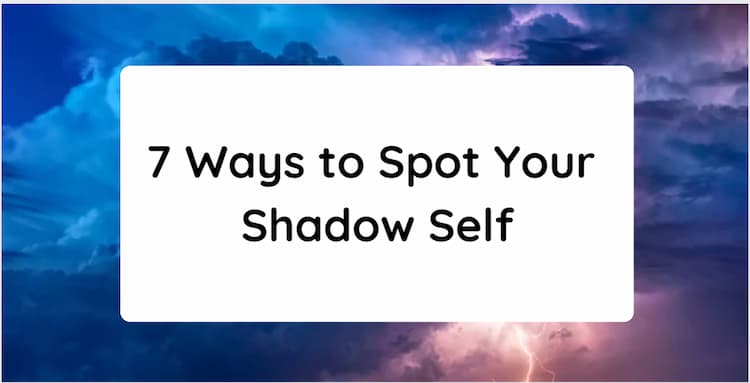
We all are aware of the term shadow – a dark silhouette that is cast on an object by a body that intercepts light. As children, we’ve been chasing shadows, or even tried to get away from shadows.
Psychologists define the word “shadow” can be defined by “either an unconscious aspect of the personality that the conscious ego does not identify in itself or the entirety of the unconscious”.
Yes, that’s somewhat difficult to comprehend without further explanation.
This article explores the concept of shadows within the framework of analytical psychology using instances that show the self as shadow. It explains how to identify the shadow you are.
What is your shadow self?
Your shadow self is the part or parts of your personality you’ve turned down in the past, and do not want to admit to being in the present. It’s often described as”the “dark side” of your personality since it is mostly composed of negative and primitive feelings.
It’s not true at all. The shadow you see is a reflection of the weak and ineffective attributes that you used to have and feeling the need to ignore or cover these attributes. These qualities need not be associated with negative implications on the outside.
Let’s look at this with some examples.
The most prominent components of your shadow include ego, anger, laziness, anger and apathy, jealousy greed, selfishness, blind desire, and a thirst for power. But, certain qualities that are viewed to be positive in general view are considered negative by you for reasons that are your personal preferences. The most effective examples are the ability to be independent, personal, and emotional sensitiveness.
These unwelcome aspects of your personality do not disappear out of thin air. Even if you refuse to acknowledge their existence, dismiss them, and even try to get rid of them however, they stay in your unconscious mind. They remain in your mind and influence your emotions, thoughts, feelings and beliefs even without being aware of it.
How can you handle that shadow you are?
As we’ve said before it’s impossible to rid yourself of your shadow self, no matter how you may want to. It’s as a shadow in your mind and will continue to affect everything you do. So, the issue is how to deal with the shadow you create?
The best way to confront the shadow side of yourself is to acknowledge the shadow self, acknowledge it, and become friends with it. The act of denying its existence could create more problems for you. Get it out of deep within your thoughts that you’ve cleared. Take it in and learn from it.
How do you spot you shadow?
You can recognize you shadow by being aware of your behaviour and the way you interact with other people. If you’re still struggling with this then you can try these easy methods to spot your shadow.
1. Your habit of judging people with brutality
This is an excellent indicator of the impact of your shadow’s influence on your behavior. Your judgment of others is based on personal weaknesses. The same weakness you resisted some time ago turned into your shadow.
You are the judge of those whom you believe you are in control of. This will reveal more about you and your fears than the behavior or the status of the person who is judged. Your own shortcomings, fears and weaknesses affect your judgment of others , and it comes out as harsh judgements.
2. Your issues are projected onto other people
Projection is a method of self-defense which involves assigning your flaws and unwelcome feelings onto someone else. If you are unhappy with something in your own life, you project it out to the eyes of others.
The image you portray is the traits you don’t like about yourself , and do not want to be a part of. They are the same traits you shun and turn into your shadow. Your projection of others exposes the aspects of the shadow you project.
Some examples:
- An unkind person who sees others as arrogant, overbearing and arrogant.
- An unfaithful person accusing their partner of being unfaithful.
- A stern parent accusing the child of being bullied.
- A person with body image issues criticizing others for their body shape.
- A child who is self-deprecating who believes that others will not like them.
3. The triggers you choose to use can cause you to embark in a destructive direction
The triggers that you experience present are a result of a prior trauma. These are the areas of weakness within your character that you’ve ignored but becoming triggers. Understanding your triggers could give you insights into the shadow you are.
4. You can troll other users on social media platforms
The anonymity provided by the internet allows you to be bold enough to say whatever you’d like about other people. Even when you are 100% knowing that your words could cause harm to others, you take the risk.
In the absence of consequences, you reveal your most vile features. These are the things you’re embarrassed of and rejected for a long time. Being aware of how you interact with others could assist you in identifying your own shadow.
5. It is common to bring it out on those that are under your authority
You might not be able to express your opinions or voice your concerns to people who are in higher posts. You’re in a position of no help to bear the brutal treatment of these individuals. These resentments accumulate and explode in anger at those dependent on you.
In the workplace, you might not be able say something to your boss, but blame it on your coworkers. In your home, you’re obliged to tolerate your annoying partner, while venting your anger on your children , or even strangers.
6. You enjoy playing the victim
If you’re in an attitude of victimization you are more likely to
- You can blame others for your mistakes.
- You are not responsible for your actions
- Keep grudges with the whole world
- Do not trust anyone.
- Doze off in self-pity
- Feel helpless and weak.
- Failure to establish boundaries
- Always prepared for arguments over trivial matters
- Uncertainty causes others to use you to their advantage
- The dreadful reality of life makes you nervous and depressed
Your behavior patterns all point to a part of the shadow you are.
7. Your inability to establish limits
If you don’t establish boundaries with the relationships you have with others, it speaks something about your past difficult experiences. Most of the time, this is due to the shame you feel about your the past and setbacks or mistakes. It is possible that you are afraid to say no due to of the missed chances or the negative reactions you experienced during the previous time.
Bottom line
You must make peace with the shadow of yourself to be at peace. When you recognize your shadow, it is time to begin to heal. This is known as shadow work.
Shadow work is about confronting the shadow, uncovering its hidden dimensions in the open , while accepting and understanding. Make sure not to shame or blame it.
If you have the shadow self at your side, and working for your benefit rather than against and you’ll find your life much more easy and enjoyable.

Hi! I am Olivia, a relationship, manifest, and self-help writer. I believe that with the right tools and mindset, anyone can improve their relationships, manifest their desires, and find inner peace and fulfillment. My writing aims to provide practical tips and strategies for personal growth and happiness. Thank you for reading and I hope my words can make a positive impact in your life.








